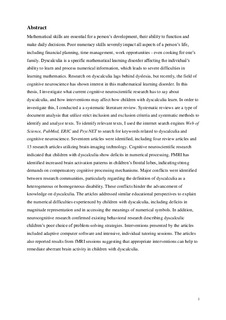Cognitive Neuroscience and Dyscalculia
Master thesis
Permanent lenke
http://hdl.handle.net/11250/2475549Utgivelsesdato
2017Metadata
Vis full innførselSamlinger
Sammendrag
Mathematical skills are essential for a person’s development, their ability to function and make daily decisions. Poor numeracy skills severely impact all aspects of a person’s life, including financial planning, time management, work opportunities - even cooking for one’s family. Dyscalculia is a specific mathematical learning disorder affecting the individual’s ability to learn and process numerical information, which leads to severe difficulties in learning mathematics. Research on dyscalculia lags behind dyslexia, but recently, the field of cognitive neuroscience has shown interest in this mathematical learning disorder. In this thesis, I investigate what current cognitive neuroscientific research has to say about dyscalculia, and how interventions may affect how children with dyscalculia learn. In order to investigate this, I conducted a a systematic literature review. Systematic reviews are a type of document analysis that utilize strict inclusion and exclusion criteria and systematic methods to identify and analyze texts. To identify relevant texts, I used the internet search engines Web of Science, PubMed, ERIC and PsycNET to search for keywords related to dyscalculia and cognitive neuroscience. Seventeen articles were identified, including four review articles and 13 research articles utilizing brain-imaging technology. Cognitive neuroscientific research indicated that children with dyscalculia show deficits in numerical processing. FMRI has identified increased brain activation patterns in children’s frontal lobes, indicating strong demands on compensatory cognitive processing mechanisms. Major conflicts were identified between research communities, particularly regarding the definition of dyscalculia as a heterogeneous or homogeneous disability. These conflicts hinder the advancement of knowledge on dyscalculia. The articles addressed similar educational perspectives to explain the numerical difficulties experienced by children with dyscalculia, including deficits in magnitude representation and in accessing the meanings of numerical symbols. In addition, neurocognitive research confirmed existing behavioral research describing dyscalculic children’s poor choice of problem-solving strategies. Interventions presented by the articles included adaptive computer software and intensive, individual tutoring sessions. The articles also reported results from fMRI sessions suggesting that appropriate interventions can help to remediate aberrant brain activity in children with dyscalculia.
